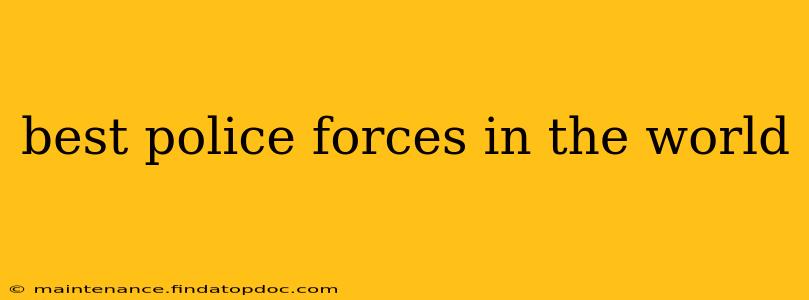Determining the "best" police force is a complex undertaking, lacking a single, universally accepted metric. Effectiveness hinges on numerous factors, including crime rates, public trust, officer training, technological advancements, and community engagement. Rather than a definitive ranking, this analysis examines leading police forces globally, highlighting their strengths and the criteria used to assess their performance. We'll also delve into frequently asked questions surrounding police effectiveness and global policing standards.
What Makes a Police Force "Good"?
A truly effective police force goes beyond simply arresting criminals. Key attributes include:
- Low Crime Rates: While not solely indicative of police effectiveness (socioeconomic factors play a significant role), lower crime rates, particularly violent crime, often suggest a well-functioning police force.
- High Public Trust: A strong relationship between the police and the community is crucial. High levels of public trust indicate effective communication, community policing strategies, and accountability.
- Effective Training and Resources: Well-trained officers with access to modern technology and adequate resources are better equipped to prevent and solve crimes. This includes specialized units for tackling specific challenges.
- Transparency and Accountability: Mechanisms for addressing police misconduct and ensuring transparency build public confidence. Independent oversight bodies play a vital role.
- Community Engagement: Proactive community policing initiatives that foster positive relationships build trust and reduce crime. This often involves working with community leaders and organizations.
- Technological Advancement: The use of data analysis, crime prediction software, and advanced communication technologies can significantly enhance police efficiency and effectiveness.
Examples of Highly Regarded Police Forces:
While a definitive ranking is subjective, several police forces consistently receive high praise for their performance and adherence to best practices. These include (but are not limited to):
- Singapore Police Force: Known for its low crime rates, high technological adoption, and community engagement initiatives. Singapore's strong emphasis on preventative measures and sophisticated surveillance technology contributes to its success.
- Royal Canadian Mounted Police (RCMP): A federal and national police force, the RCMP serves a vast and diverse territory. Its effectiveness is often attributed to its rigorous training standards and a decentralized structure.
- Netherlands National Police: The Dutch police are lauded for their community-oriented approach, emphasizing collaboration and problem-solving. They actively involve citizens in crime prevention.
- Hong Kong Police Force: Despite recent challenges, the HKPF historically maintained a strong reputation for professionalism and effectiveness, particularly in maintaining order and responding to crises.
- Metropolitan Police Service (London, UK): The Met Police, while facing scrutiny regarding certain aspects of its operations, remains one of the largest and most experienced police forces globally, with a focus on counter-terrorism and major crime investigation.
It's vital to understand that each force operates within a specific context, influencing its challenges and successes. Crime rates and policing strategies vary significantly based on societal structures, demographics, and available resources.
Frequently Asked Questions (FAQs):
What are the key performance indicators (KPIs) used to measure police effectiveness?
KPIs vary but commonly include crime rates (violent and property), clearance rates (solved cases), public satisfaction surveys, response times, officer-involved shootings, and complaints against officers. A holistic approach considers multiple indicators, not just a single metric.
How do different countries' policing philosophies influence their effectiveness?
Policing philosophies range from a more authoritarian approach focused on law enforcement to community-oriented policing prioritizing collaboration and crime prevention. Each philosophy has advantages and disadvantages, and effectiveness depends on the specific context and community needs.
What role does technology play in modern policing?
Technology plays a crucial role, from body cameras and crime mapping to predictive policing and facial recognition. These technologies enhance efficiency and accountability but also raise ethical concerns about privacy and potential bias.
How can police forces improve public trust?
Building public trust requires transparency, accountability, community engagement, and proactive measures to address police misconduct. Investing in community relations programs, actively seeking feedback, and implementing effective oversight mechanisms are critical.
Are there international standards for policing?
While no single, universally enforced standard exists, international organizations like INTERPOL promote best practices and collaboration among police forces globally. Many countries adhere to principles outlined in international human rights law concerning policing practices.
In conclusion, identifying the single "best" police force is impossible due to the diverse contexts and varied criteria for effectiveness. However, by studying the strengths of leading police forces and understanding the multifaceted factors contributing to their success, we can gain valuable insights into effective policing strategies globally.
